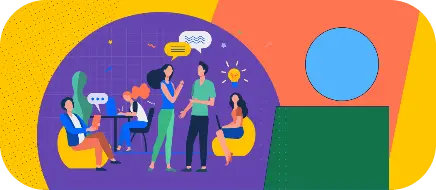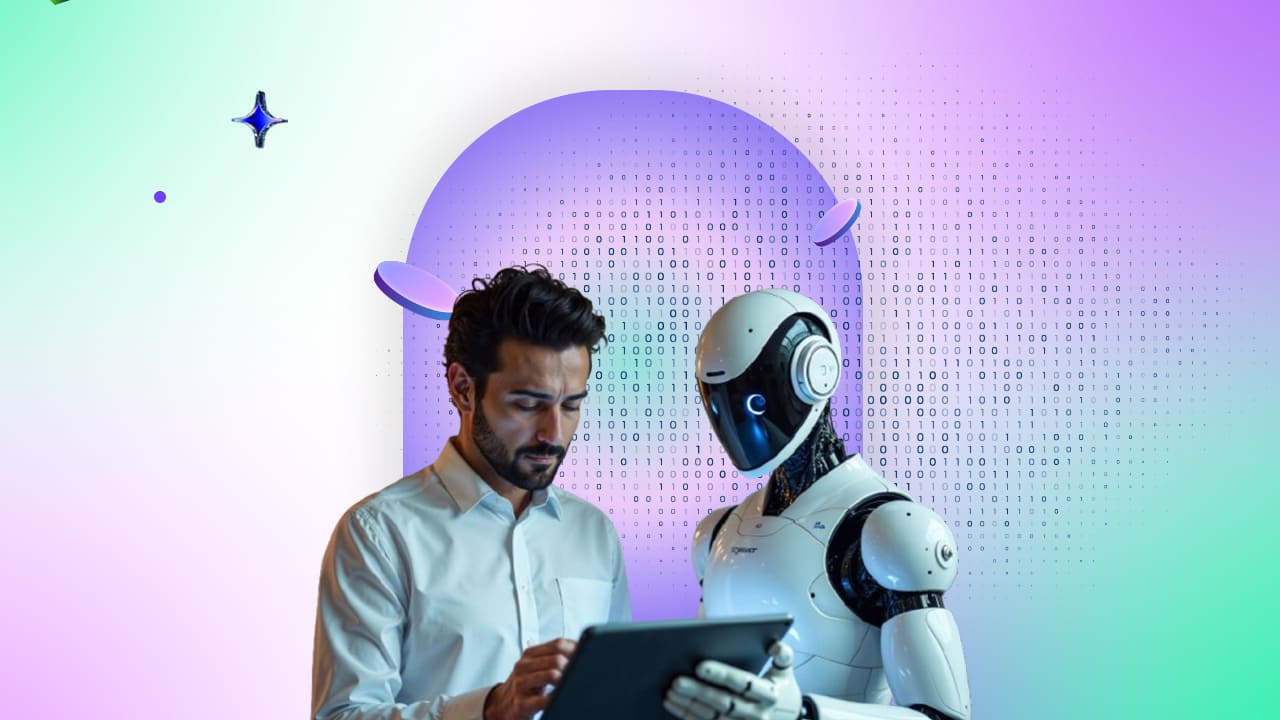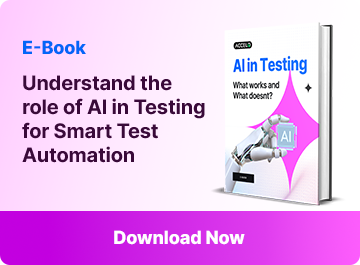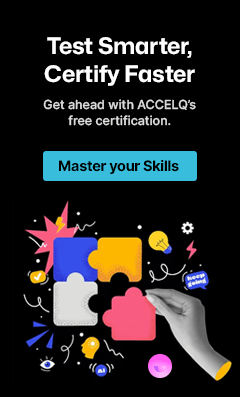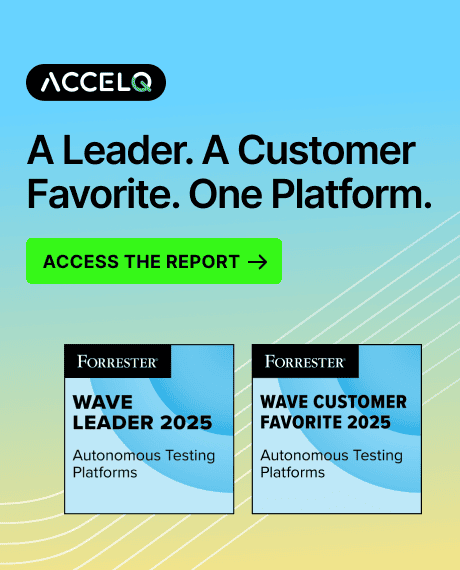Why AI Isn’t Replacing Testers: It’s Empowering Them

The rise of AI in software testing raises critical questions for quality leaders: How will this technology impact team structures, skill requirements, and QA budgets? Beneath the dramatic headlines lies a strategic opportunity – organizations that position their testers as AI collaborators rather than competitors are achieving unprecedented quality outcomes and operational efficiency.
“Will AI replace software testers?” dominates industry discussions, creating unnecessary fear. The reality shows that automation tools handle routine execution while human testers armed with AI capabilities solve complex quality challenges, command higher salaries, and gain unprecedented influence in product decisions.
- Will AI replace automation testers? Understanding the Myth
- What AI Can and Cannot Automate?
- The Evolution of Testing Roles
- Beyond Automation: AI as an Intelligence Amplifier
- AI-Enhanced Testing Practices
- The New Testing Skillset in an AI-Augmented World
- Real-World Success: Testers Thriving with AI
- Conclusion
Will AI replace automation testers? Understanding the Myth
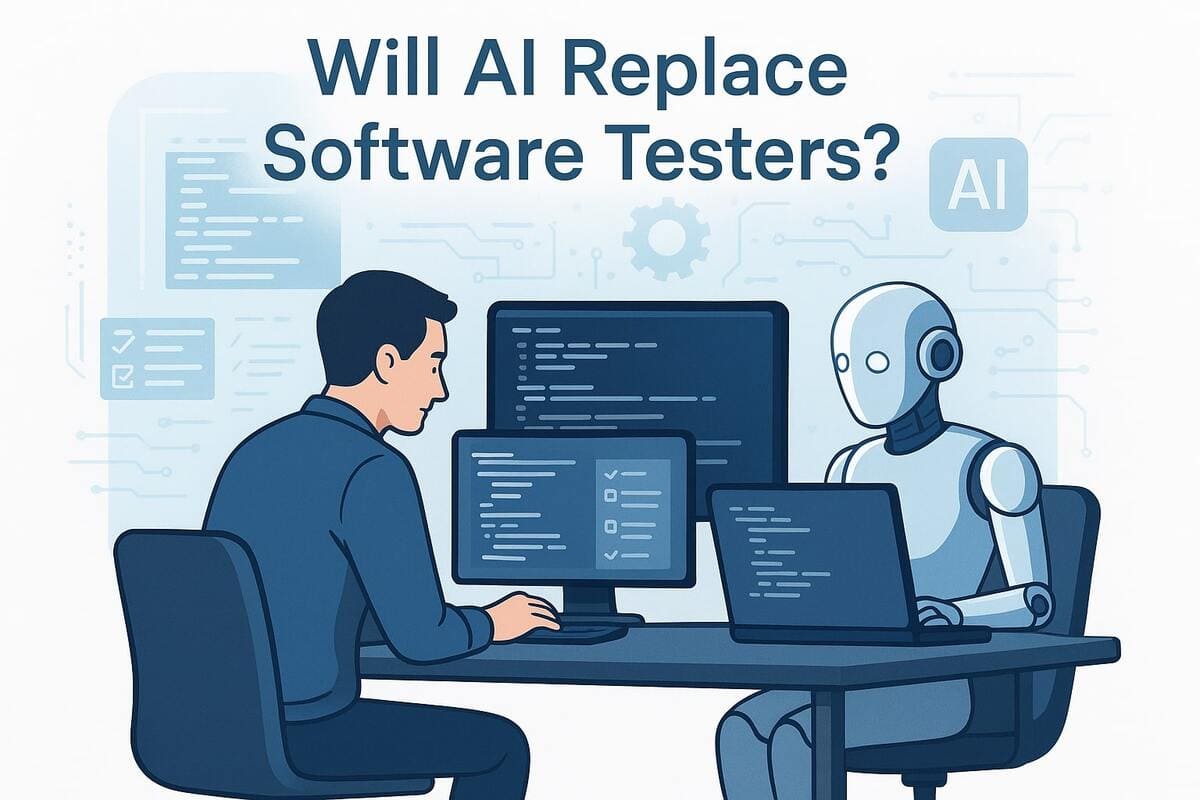
When headlines ask, “Will AI replace automation testers?”, remember that technological revolutions transform work rather than eliminate it. The testing profession stands at perhaps its most pivotal evolution yet.
The narrative that artificial intelligence will eliminate testing roles overlooks crucial realities. Human vs AI testing capabilities aren’t competing forces; complementary strengths create unprecedented quality outcomes when properly integrated.
According to Gartner, by 2027, 80% of enterprises will integrate AI-augmented testing tools, up from just 15% in 2023 (Source: Gartner). This growth reflects an industry embracing AI as a partner, not a replacement.
What AI Can and Cannot Automate?
Understanding AI’s actual role helps QA leaders make smarter investment decisions.
What AI can automate:
- Repetitive test execution across environments
- Pattern recognition within vast datasets
- Self-healing of test scripts when elements change
- Test case generation based on requirements
- Bug pattern detection and categorization
What remains uniquely human:
- Contextual understanding of business requirements
- Critical evaluation of results against business goals
- Strategic test planning, balancing resources and risk
- Exploratory testing discovers unexpected issues
- Stakeholder communication about quality risks
The Evolution of Testing Roles
As AI reshapes the testing landscape, testers evolve with AI and move into more strategic, influential organizational positions. QA leads now influence release planning, risk assessments, and business-critical decision-making, shifting from execution to strategic quality leadership.
The shift happens across multiple dimensions:
- From executor to orchestrator: Testers design strategies using AI tools, focusing on what needs testing rather than executing repetitive steps.
- From reactive to predictive: With AI’s help, testers anticipate issues before they occur, preventing defects rather than merely finding them.
- From isolated testing to quality advocacy: As AI handles routine testing, professionals engage throughout development as quality champions.
- From implementers to advisors: While AI manages details, testers align quality with business goals and guide critical decisions.
Organizations adopting AI-powered testing report a 65% reduction in test creation time and an 80% decrease in maintenance effort, redirecting valuable human resources toward higher-value activities.
Beyond Automation: AI as an Intelligence Amplifier
The true power of AI extends beyond simple automation. AI is an intelligence amplifier for human testers, enabling teams to achieve results neither could accomplish alone. By handling mechanical aspects, AI liberates human intelligence for creative problem-solving and strategic initiatives.
Many testing teams initially approach AI with caution, even skepticism. They’ve seen automation promises fall short, creating more maintenance headaches than solutions. However, those who embrace well-designed AI tools typically experience something unexpected. This significant productivity boost allows focus on high-value activities that limit their strategic contributions for testing in the first place.
This transformation doesn’t happen overnight. It requires thoughtful implementation, training, and a willingness to reimagine testing workflows. However, organizations that push through this transition phase discover their testers contributing in ways management never anticipated – spotting critical business risks earlier, driving design improvements before coding begins, and quantifying quality in terms executives understand and value.
Complementary Strengths: Human Intuition Meets Machine Learning
The combined strength of human context and machine precision yields exponential testing ROI, as demonstrated in the following comparison:
| AI Strengths | Human Strengths | Combined Impact |
|---|---|---|
| Processing vast data | Contextual interpretation | Comprehensive insights |
| Pattern detection | Intuitive exploration | Earlier defect detection |
| Consistent execution | Creative problem-solving | Higher test coverage |
| Rapid test generation | Strategic prioritization | Optimized efficiency |
This collaboration delivers superior results compared to either humans or machines working alone.
AI-Enhanced Testing Practices
In real implementations, AI enhances software testing expertise rather than replacing it. The partnership between professional judgment and artificial intelligence transforms software quality.
Intelligence-Driven Test Case Design
AI transforms test design by:
- Analyzing complex requirements exceeding human processing capacity
- Identifying edge cases that might escape experienced testers
- Exposing hidden test gaps across complex workflows
- Prioritizing efforts based on sophisticated risk analysis
The World Quality Report confirms this trend, finding that 75% of organizations invest in AI for QA processes (Source: Capgemini).
Accelerated Bug Identification and Triage
AI transforms defect management by:
- Correlating patterns across seemingly unrelated failures
- Grouping similar issues to streamline resolution
- Predicting problematic code areas based on complexity metrics
- Aligning prioritization with actual business impact
The New Testing Skillset in an AI-Augmented World
The testing profession continues to evolve rather than disappear. This transformation demands an updated skillset blending traditional expertise with technological literacy.
Today’s testing professionals develop proficiency in:
- Creating precise prompts that generate valuable test scenarios
- Fine-tuning AI parameters for specific application characteristics
- Providing business context, ensuring relevant test generation
- Critically evaluating AI-generated scenarios against real-world usage
Real-World Success: Testers Thriving with AI
One major American financial services company with over $1.7 trillion in assets transformed its testing approach with ACCELQ. Their team evolved into strategic roles while achieving:
- 2.3 million test executions
- 378 CI/CD suites
- 72% reduction in quality costs
- 7.5x faster delivery speeds
Ready to achieve similar results? Schedule a personalized ACCELQ demo today and discover how your testing team can evolve rather than be replaced.
Their team reported, “The ACCELQ testing platform helps us stay ahead of rapid changes and iterations in our large-scale enterprise platform, ensuring we deliver only quality enhancements.”
The U.S. Bureau of Labor Statistics predicts that jobs for software testers will grow at a “much faster” rate than average through 2033, with AI specifically mentioned as a growth driver (Source: U.S. Bureau of Labor Statistics).
Conclusion: The Future is Human + AI
The software testing career in the AI era continues to evolve rather than disappear. It’s transforming into something more valuable and strategic. Professionals who embrace AI as a partner will thrive in this new landscape.
Leading solutions like ACCELQ demonstrate this partnership approach, transforming testing through AI while preserving the human element. ACCELQ’s intelligent automation reduces test creation time by 65% and maintenance effort by 80%, freeing professionals to focus on strategic quality guidance.
Will AI replace software testers? The evidence indicates otherwise. How AI changes testing roles points to an exciting future where human judgment becomes increasingly valuable. The question isn’t whether automation testers will be replaced by AI, but how quickly they’ll adapt to leverage these powerful tools.
Nishan Joseph
VP Sales Engineering
Nishan is a tech strategist with expertise in Test Automation and roles at giants like TCS, Microfocus, and Parasoft. At ACCELQ, he champions Strategic Alliances, cultivating global tech partnerships. Educated at Leeds University and Symbiosis Pune, he also possesses an engineering background from Bangalore.
You Might Also Like:
 AI Test Automation for nCino | Powering Fintech Innovation
AI Test Automation for nCino | Powering Fintech Innovation
AI Test Automation for nCino | Powering Fintech Innovation
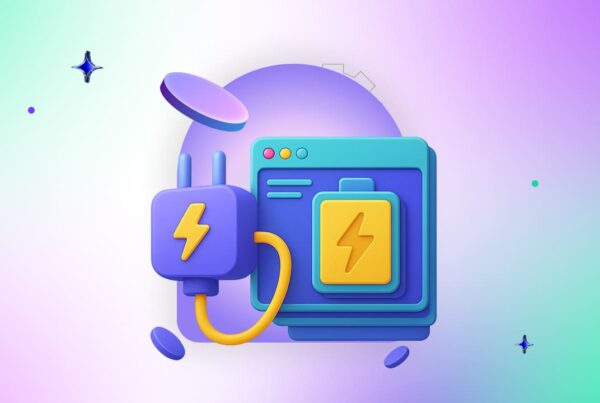 Supercharge Testing with AI: Automate & Accelerate Efficiency
Supercharge Testing with AI: Automate & Accelerate Efficiency
Supercharge Testing with AI: Automate & Accelerate Efficiency
 How Agentic Automation Is Transforming Modern QA Workflows?
How Agentic Automation Is Transforming Modern QA Workflows?
